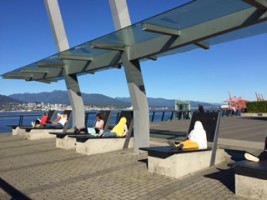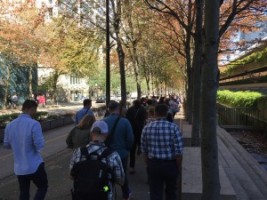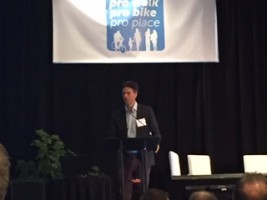I first visited Vancouver for a few days of vacation in 2012. It is a place that I’ve always known that I would return to. That opportunity arose when I was asked to attend the Placemaking Leadership Forum conference in September, which I will talk about in a minute. First, a few observations about Vancouver.


Although I have never been a big fan of glass architecture, I’m beginning to understand the role it plays in connecting people to its buildings. You see slim towers with low rise podiums, which have rooftop patios and trees, (to attract the suburbanites). The towers are separated and seem to float above the podiums. Images of people and places can be seen through these buildings, creating a relationship between the people and the buildings.
With this backdrop, two main events took place during the week of September 12-18: the Pro Walk/Pro Bike/Pro Place Annual Conference, and the Placemaking Leadership Forum, building on the Project for Public Spaces (PPS) Placemaking Leadership Council and the discussions on the outcome of the three Future of Places conference series. (The New Urban Agenda, the agreed upon outcome of the three Future of Places conferences, was adopted in Quito, Ecuador, in October 2016.)Â I only attended the Placemaking Leadership Forum, but both conferences took place at the same venue and overlapped, providing an exhilarating hub for placemakers around the world.

Although I have been attending placemaking conferences for several years now, I always leave with new ideas and concepts to add to the conversation. This conference was no exception. Listed here are some notable takeaways worth thinking about:
- “We don’t want a masterpiece but a great canvas – it’s the layers afterwards that matter.” (Eduardo Santana-Pershing, executive director, Pershing Square Renew)
- “The system isn’t broken, it was built this way.” (Husam Alwaer, professor of Urban Design, Scotland)
- “First life, then spaces, then buildings – the other way around never works.” (Jan Gehl, Danish architect and urban design consultant)
- “People change their habits according to services and infrastructure provided.”
- “The new generation wants to consume experiences.”
- “From a health perspective, there is nothing more important than placemaking”
- “Placemaking for peacemaking.” (Rony Al Jalkh, visiting fellow, PPS)
- “At their heart, cities are the absence of physical space between people.” (Ed Glaeser, American economics and author)